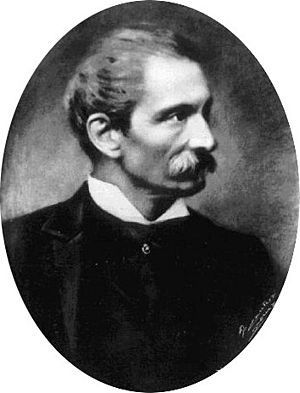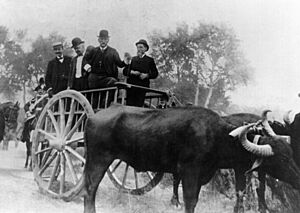Giuseppe Zanardelli facts for kids
Quick facts for kids
Giuseppe Zanardelli
|
|
|---|---|
 |
|
| Prime Minister of Italy | |
| In office 15 February 1901 – 3 November 1903 |
|
| Monarch | Victor Emmanuel III |
| Preceded by | Giuseppe Saracco |
| Succeeded by | Giovanni Giolitti |
| President of the Italian Chamber of Deputies | |
| In office 16 November 1898 – 25 May 1899 |
|
| Preceded by | Giuseppe Branchieri |
| Succeeded by | Luigi Chinaglia |
| In office 5 April 1897 – 14 December 1897 |
|
| Preceded by | Tommaso Villa |
| Succeeded by | Giuseppe Branchieri |
| In office 23 November 1892 – 20 February 1894 |
|
| Preceded by | Giuseppe Branchieri |
| Succeeded by | Giuseppe Branchieri |
| Minister of the Interior | |
| In office 21 June 1903 – 2 November 1903 |
|
| Prime Minister | Giovanni Giolitti |
| Preceded by | Giovanni Giolitti |
| Succeeded by | Giovanni Giolitti |
| In office 28 March 1878 – 19 December 1878 |
|
| Prime Minister | Benedetto Cairoli |
| Preceded by | Agostino Depretis |
| Succeeded by | Agostino Depretis |
| Minister of Justice | |
| In office 29 May 1881 – 25 May 1883 |
|
| Prime Minister | Agostino Depretis |
| Preceded by | Tommaso Villa |
| Succeeded by | Bernardino Giannuzzi-Savelli |
| In office 4 April 1887 – 6 February 1891 |
|
| Prime Minister | Francesco Crispi |
| Preceded by | Diego Tajani |
| Succeeded by | Luigi Ferraris |
| In office 14 December 1897 – 1 June 1899 |
|
| Prime Minister | Antonio Starabba |
| Preceded by | Emanuele Gianturco |
| Succeeded by | Teodorico Bonacci |
| Personal details | |
| Born | 29 October 1826 Brescia, Kingdom of Lombardy–Venetia |
| Died | 26 December 1903 (aged 77) Maderno, Kingdom of Italy |
| Nationality | Italian |
| Political party | Historical Left Dissident Left |
Giuseppe Zanardelli (born October 29, 1826 – died December 26, 1903) was an Italian lawyer and politician. He served as the Prime Minister of Italy from 1901 to 1903. Zanardelli was a great speaker and a leader in a group called the Freemasons.
He came from a middle-class family in Lombardy, a region in Italy. He believed in important ideas like giving more people the right to vote, keeping government separate from the church, protecting people's freedoms, and allowing businesses to operate freely. Throughout his long career, he strongly supported people's right to believe what they wanted and the idea of divorce.
Contents
Early Life and Education
Giuseppe Zanardelli was born in Brescia, a city in Lombardy, on October 29, 1826. When he was young, he fought as a volunteer in a war for Italy's independence in 1848. This was part of a bigger movement called the Italian unification (Risorgimento), which aimed to unite all of Italy.
After a battle they lost in 1849, he went to Pisa to study law. He then returned to Brescia to become a lawyer. In 1859, he had to escape to Switzerland for a short time. He moved to Lugano, but soon came back to help organize a rebellion in Brescia during the Second Italian War of Independence. He even welcomed the famous leader Giuseppe Garibaldi to the city.
Zanardelli joined a group called the "Hunters of the Alps" and stayed with them until a peace agreement was signed. When Lombardy joined Piedmont, he was elected to the Italian Parliament in Turin. He became a Freemason in 1860.
Political Career
Zanardelli was elected as a member of Parliament in 1859. He held various government jobs, but he became a political minister in 1876. This was when his political group, the Left, came into power.
In 1876, he became the Minister of Public Works in the government led by Agostino Depretis. This role involved overseeing big building projects. In 1878, he became the Minister of the Interior under Benedetto Cairoli. In this job, he helped create a new law to expand who could vote.
He left government for a short time but returned in 1881 as the Minister of Justice in Depretis's government. As Minister of Justice, he helped finish a new set of business laws. He also worked on an important electoral reform in 1892. This reform lowered the voting age from 25 to 21. It also made it easier for people to vote if they paid less tax or had an elementary school certificate.
Zanardelli left government again in 1883 but returned in 1887 as Minister of Justice. He kept this job through the next government led by Francesco Crispi, until 1891. During this time, he started to reform the justice system. He also created a new penal code, which was a set of laws about crimes and punishments. This new code made laws the same across Italy, ended the death penalty, and recognized that workers had the right to strike. Many European lawyers at the time thought this code was a great achievement.
After the government of Giovanni Giolitti fell in 1893, Zanardelli tried to form his own government but was not successful. He was elected president of the Chamber of Deputies (a part of the Italian Parliament) in 1894 and 1896. He did this job very well. In 1897, he became Minister of Justice again, but he resigned in 1898 because he disagreed with another minister about how to prevent future problems after some public unrest.
Prime Minister of Italy
Zanardelli returned to being president of the Chamber of Deputies. He later left this role to join a campaign against a new law that would limit political activity and free speech. Because of his efforts, he was able to form a new government in February 1901, with support from other political groups. He became the Prime Minister of Italy. Giovanni Giolitti became his Minister of the Interior and was a very important part of his government.
As Prime Minister, Zanardelli focused on helping the poorer southern regions of Italy. In September 1902, he traveled through Basilicata, one of the poorest areas, to see the problems for himself. However, Zanardelli's health was not good, so he couldn't achieve as much as he wanted during his time as Prime Minister. He proposed a law to allow divorce, and while it passed in one part of Parliament, it had to be stopped because many people in the country were against it.
He retired from his position on October 21, 1903, due to his illness. Giolitti took over as Prime Minister. Giuseppe Zanardelli passed away in Maderno on December 26, 1903.
Honours
 Kingdom of Prussia: Knight of the Order of the Black Eagle – August 1902 – during the visit to Germany of King Victor Emmanuel III of Italy.
Kingdom of Prussia: Knight of the Order of the Black Eagle – August 1902 – during the visit to Germany of King Victor Emmanuel III of Italy. Ottoman Empire: Grand Cordon of the Order of Osmanieh – September 1902 – during the visit to Constantinople of an Italian Regia Marina squadron.
Ottoman Empire: Grand Cordon of the Order of Osmanieh – September 1902 – during the visit to Constantinople of an Italian Regia Marina squadron. France: Grand Cross of the Legion d'Honneur – November 1902 – ″in testimony of the good relations between France and Italy″.
France: Grand Cross of the Legion d'Honneur – November 1902 – ″in testimony of the good relations between France and Italy″.
Images for kids
See also
 In Spanish: Giuseppe Zanardelli para niños
In Spanish: Giuseppe Zanardelli para niños
 | William M. Jackson |
 | Juan E. Gilbert |
 | Neil deGrasse Tyson |



